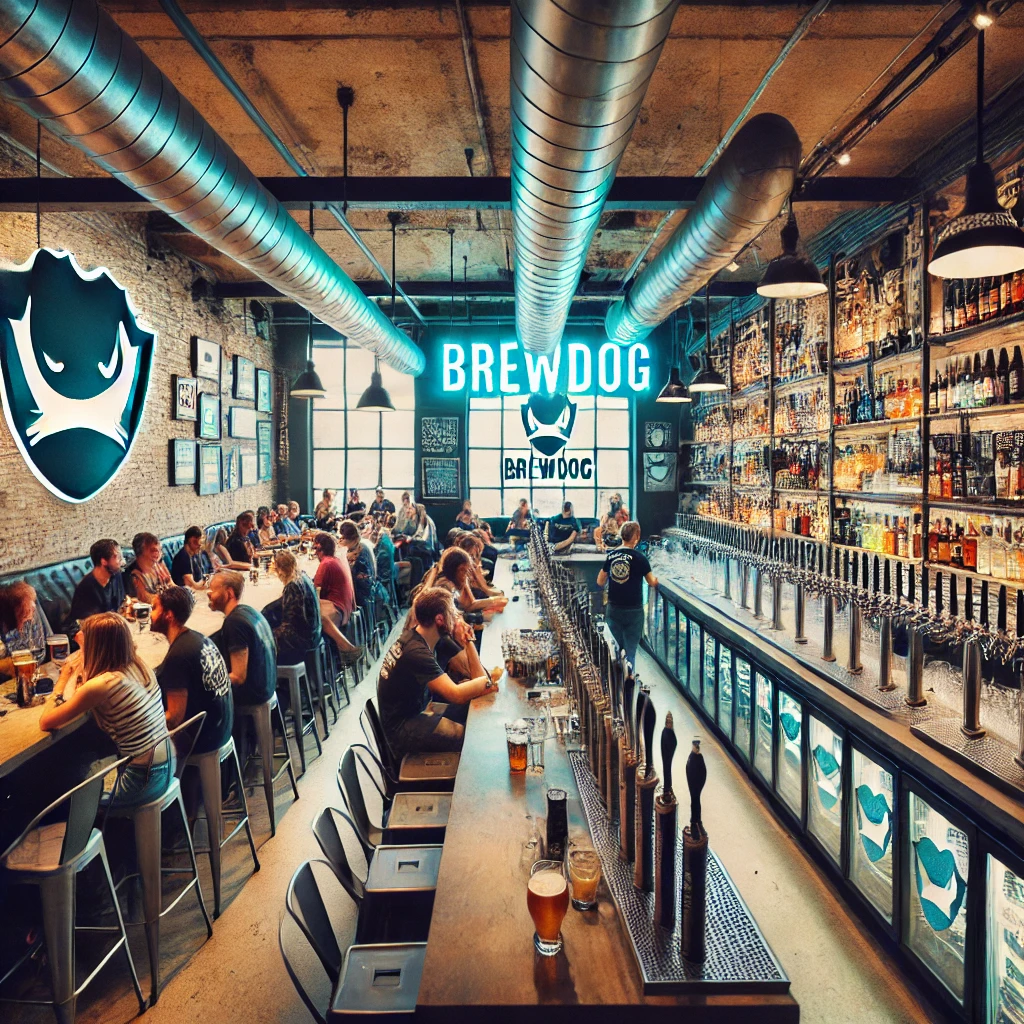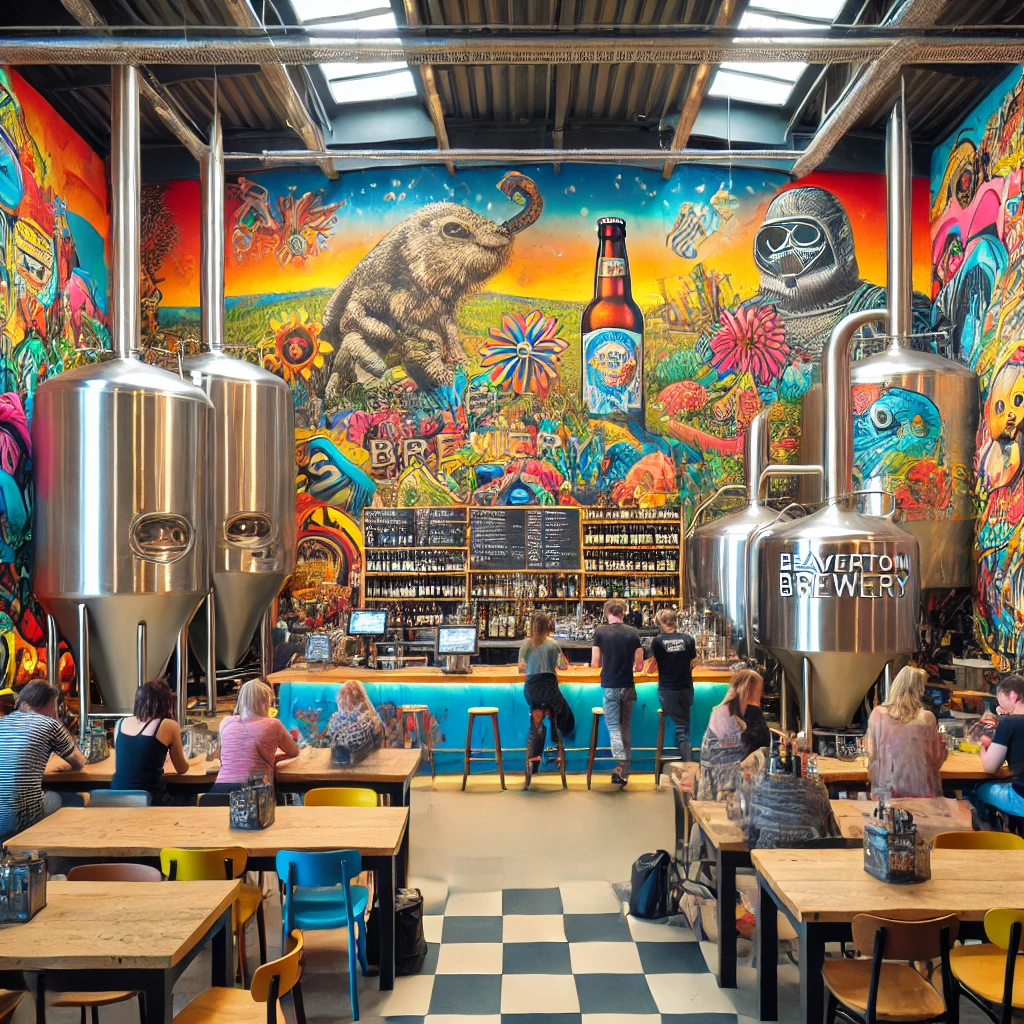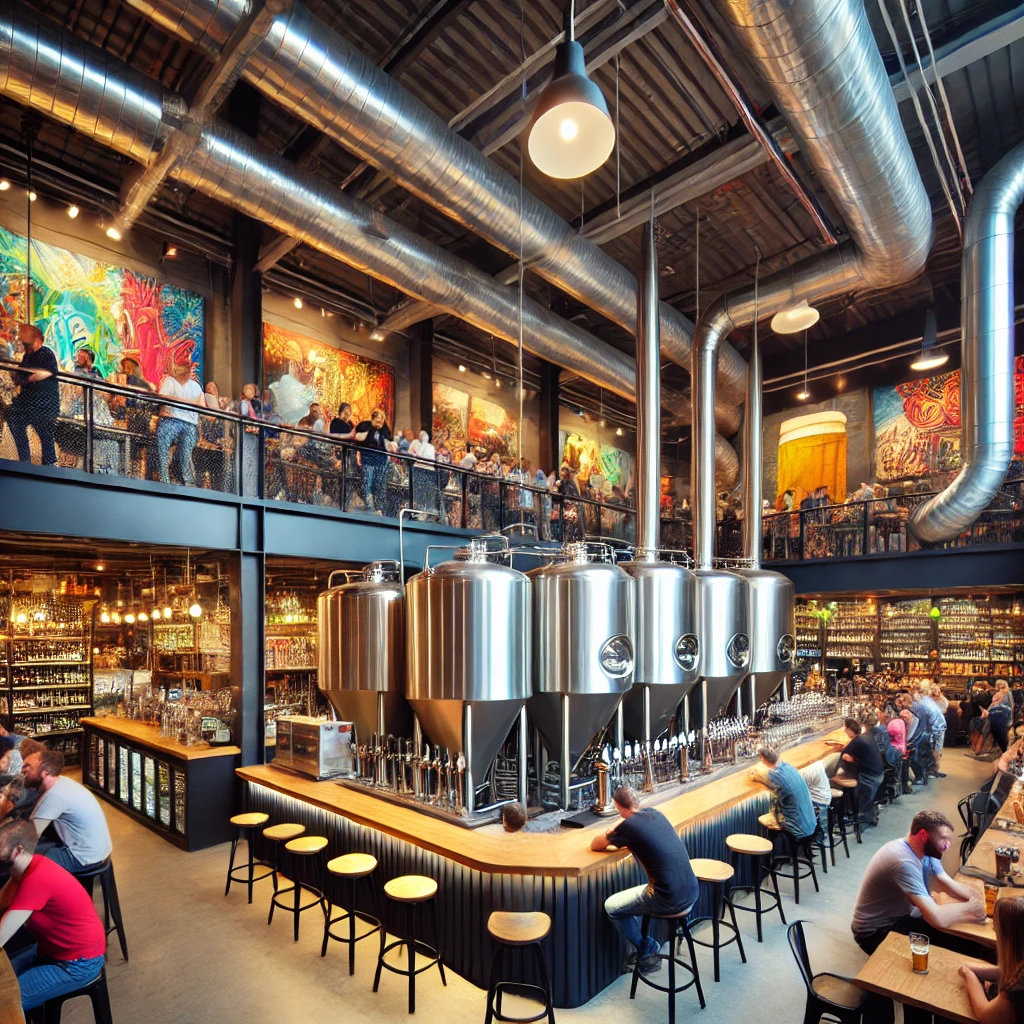Table of Contents
Introduction to the Craft Beer Revolution
The craft beer revolution signifies a monumental shift in the way consumers perceive and consume beer in the UK. Over the past decade, the landscape has transformed drastically, moving away from mass-produced lagers and ales towards a more localized and artisanal approach. A rising number of beer enthusiasts are now favoring small, independent breweries, drawn by their commitment to quality, innovation, and unique flavor profiles.
This change in consumer preferences has stemmed from a desire for greater authenticity and connection to the beer-making process. Discerning drinkers seek brews crafted with care, often exploring the stories and craftsmanship behind each pint. The days of generic, one-size-fits-all beers are gradually fading, giving way to a diverse array of options that surprise and delight the palate.
Moreover, the demand for unique and high-quality brews has spurred an unprecedented growth of microbreweries and artisanal beer makers across the UK. These small-scale operations prioritize traditional brewing techniques, often experimenting with locally sourced ingredients and innovative recipes. As a result, craft breweries are becoming the epicenters of beer culture, where passion and creativity meld seamlessly.
The UK, with its rich brewing heritage and burgeoning craft beer scene, proudly stands as home to some of the world’s finest craft breweries. From bustling urban centers to serene countryside locales, independent brewers are redefining the nation’s beer experience. This surge in craftsmanship has not only elevated the quality of beer available but also fostered a vibrant community of beer aficionados who appreciate the subtleties and complexities of craft brews.
As we delve deeper into the craft beer revolution, we will explore the premier craft breweries that have risen to prominence and become essential stops for any beer lover traveling through the UK. Join us on this journey through hoppy IPAs, rich stouts, and everything in between, as we celebrate the artistry and dedication that defines the British craft beer movement.
The Historic Roots of UK Brewing
The United Kingdom’s brewing tradition boasts a rich and storied history, evolving significantly over the centuries. This journey began as early as the medieval period, where monastic communities were pivotal in developing the initial frameworks of brewing. Monasteries, with their access to ample grain supplies, became the epicenters for beer production, perfecting early brewing techniques that laid the foundation for future innovations.
The evolution of UK beer culture took a significant turn during the 18th century, coinciding with the onset of the Industrial Revolution. This period saw the introduction of advanced brewing machinery, which drastically improved the efficiency and consistency of beer production. Key milestones such as the invention of the steam engine and the adoption of the hydrometer revolutionized the brewing process, allowing breweries to scale up their operations and increase output while maintaining quality. Additionally, this era marked the rise of iconic beer styles like Porter and Pale Ale, distinctly associated with British brewing heritage.
As we transitioned into the 19th and 20th centuries, further advancements in brewing technology emerged. The introduction of refrigeration and pasteurization allowed for better storage and distribution, preserving the beer’s quality over extended periods and distances. Despite these changes, traditional brewing methods remained highly regarded, forming a unique intersection of heritage and innovation.
In recent years, the craft beer movement has paid homage to these historic roots while pushing the boundaries of flavor and style. Modern craft brewers in the UK are revitalizing ancient brewing techniques, such as barrel-aging and spontaneous fermentation, to create innovative brews that resonate with contemporary palates. This blending of time-honored traditions with new-age creativity has solidified the UK’s reputation as a global hub for diverse and exceptional craft beer.
Ultimately, the UK’s brewing history is a testament to the enduring legacy and adaptability of its beer culture. Today’s craft beer revolution, built on the foundations laid by centuries of brewing expertise, continues to thrive, shaping the future of beer one innovative pint at a time.
BrewDog

BrewDog, headquartered in Ellon, Scotland, but with a significant presence in London, stands as a pioneer in the craft beer revolution. Established in 2007 by James Watt and Martin Dickie, this brewery has grown rapidly to become synonymous with innovative and bold craft beers. Their flagship beer, Punk IPA, is renowned for its aggressive hop character and fruity aroma, making it a favorite among craft beer enthusiasts. BrewDog prides itself on its rebellious spirit and its commitment to creating beers that push the boundaries of traditional brewing techniques.
Beavertown Brewery

Founded by Logan Plant in 2011, Beavertown Brewery in North London has swiftly become one of the most influential names in the UK’s craft beer scene. Known for its distinctively vibrant branding and imaginative flavors, Beavertown offers a range of beers that are as visually appealing as they are delicious. Gamma Ray, a bold and fruity American Pale Ale, and Neck Oil, a smooth session IPA, are among their most acclaimed offerings. The brewery’s commitment to quality and creativity is evident in every pint, making it a must-visit for craft beer aficionados.
Camden Town Brewery
Camden Town Brewery, situated in the heart of London, has been a trailblazer since its inception in 2010. Founded by Jasper Cuppaidge, this brewery has gained widespread acclaim for its fresh, top-quality beers and its innovative approach to brewing. The Camden Hells Lager is a standout, blending the best of traditional German Helles with modern craft beer techniques. Camden Town Brewery’s dedication to perfecting the lager has garnered a loyal following and established it as a cornerstone of the craft beer community in England.
These top craft breweries in England represent the diversity and creativity that define the UK’s craft beer revolution. Each of these breweries offers a unique experience, whether through groundbreaking beers, innovative brewing techniques, or a vibrant atmosphere. Visiting these breweries provides an opportunity not only to taste exceptional beers but also to witness the passion and effort that goes into every brew.
Exploring Scotland’s Craft Beer Scene
Scotland has become a significant player in the craft beer revolution, offering a diverse array of unique flavors and ingredients that capture the essence of its rich brewing heritage. Known for its commitment to quality and innovation, Scotland’s craft breweries have carved out a niche within the competitive landscape of the global beer market.
One of the most iconic names in the Scottish craft beer scene is BrewDog. Founded in 2007 in Fraserburgh by James Watt and Martin Dickie, BrewDog has grown from a small brewery into a world-renowned brand with a fervent following. BrewDog’s beers, such as the flagship Punk IPA and the rich, decadent The Kingpin Lager, are celebrated for their bold flavors and fearless approach to brewing. The brewery also prides itself on its sustainable business practices and community engagement initiatives, setting a benchmark for others in the industry.
Innis & Gunn, another standout in Scotland’s craft beer landscape, brings a unique twist to traditional brewing methods. Established in 2003, Innis & Gunn is renowned for its use of oak barrels to impart distinctive flavors to their beers. Their Original Oak Aged Beer, with its toffee and vanilla notes, is a testament to the innovative techniques employed by the brewery. Additionally, Innis & Gunn’s creative use of ingredients and aging processes highlight their relentless pursuit of perfection and differentiation in the crowded craft beer market.
Tempest Brewing Co., located in the Scottish Borders, embodies the adventurous spirit of modern craft brewing. Since its inception in 2010, Tempest Brewing has focused on producing high-quality, small-batch brews that showcase bold tastes and dynamic combinations. Their Mexicake, a rich and spicy imperial stout, and Long White Cloud, a refreshing New Zealand pale ale, are prime examples of the brewery’s dedication to diversity and experimentation in flavor profiles.
Scotland’s craft beer industry is a testament to the country’s brewing prowess and innovative spirit. With an ever-growing number of breweries pushing the boundaries of traditional beer, Scotland remains a pivotal contributor to the global craft beer revolution, attracting enthusiasts from all around the world eager to sample its liquid artistry.
Welsh Wonders: Craft Breweries in Wales
Wales has revolutionized its brewing scene, emerging as a formidable player in the UK’s craft beer industry. The Welsh countryside and cities alike host a growing number of breweries that blend traditional techniques with innovative approaches, producing distinct and flavorful beers. The craft beer scene in Wales thrives on local ingredients and a robust community spirit, evident in the unique beers crafted by standout breweries such as Tiny Rebel Brewery, Wye Valley Brewery, and Crafty Devil Brewing.
Tiny Rebel Brewery, based in Newport, has garnered a reputation for its inventive creations and bold flavors. Tiny Rebel’s signature beers, such as the tropical-infused “Cwtch” and the fruity “Clwb Tropicana,” showcase the brewery’s commitment to pushing boundaries. This dynamic approach is complemented by an ethos of innovation and community engagement, making it a must-visit for craft beer enthusiasts exploring Wales.
Another cornerstone of the Welsh craft beer landscape is Wye Valley Brewery. Nestled near the picturesque Wye Valley, this brewery emphasizes sustainability and the use of local ingredients. Beers such as the “HPA” (Hereford Pale Ale) and the richly flavored “Butty Bach” exemplify Wye Valley Brewery’s dedication to quality and tradition. Their eco-conscious brewing practices, combined with the stunning rural backdrop, offer a brewing experience that is both authentic and environmentally friendly.
Crafty Devil Brewing, based in Cardiff, adds another layer to the vibrant Welsh craft beer scene with its emphasis on bold and experimental brews. Known for their small-batch, hand-crafted approach, Crafty Devil produces a range of beers that cater to diverse tastes. The “Mikey Rayer All Dayer” and “Safe As Milk Stout” are just a few examples of the brewery’s creativity and skill. Crafty Devil’s enthusiastic embrace of innovation ensures its place as a key player in Wales’s craft beer revolution.
These breweries not only highlight the unique qualities of Welsh beer but also contribute significantly to the region’s growing reputation in the craft beer world. Each brewery brings its distinct flair, making Wales an essential destination for anyone keen to explore exceptional craft beers.
Northern Ireland’s craft beer industry is experiencing a remarkable transformation, fueled by a burgeoning interest in unique, locally-brewed beers. This emerging landscape is characterized by a fusion of innovation, tradition, and community spirit. Among the trailblazers in this movement is Boundary Brewing Cooperative, an enterprise that not only stands out for its exceptional craft beers but also for its cooperative business model. Boundary Brewing invites consumers to become members, thereby involving them directly in the brewing process and decision-making activities. This collaborative approach has resulted in a range of distinctive beers that expertly blend international styles with local ingredients, earning the brewery accolades on both national and international platforms.
Another significant player in Northern Ireland’s craft beer scene is Whitewater Brewery. Established in an old barn in the Mourne Mountains, Whitewater Brewery combines scenic beauty with high-quality brewing. Known for its robust range of ales and stouts, Whitewater gains considerable recognition through consistent quality and innovation. The brewery has successfully expanded its distribution beyond local borders, bringing its unique flavors to a broader audience and establishing itself as a key representative of Northern Irish craft beer craftsmanship.
Hillstown Brewery rounds out the trio of Northern Ireland’s notable craft beer establishments. Originating from a farm, Hillstown initially began as a project to improve cattle feed by creating stout-infused fodder. The resulting venture into craft brewing has since grown exponentially, with Hillstown Brewery producing a diverse array of beers that reflect a deep-rooted appreciation for flavor and quality. Hillstown’s efforts have not gone unnoticed; the brewery is frequently lauded in competitions, solidifying its status as a rising star in the craft beer industry.
Together, these breweries exemplify the dynamism and creativity driving Northern Ireland’s craft beer revolution. By combining local traditions with innovative techniques, Boundary Brewing Cooperative, Whitewater Brewery, and Hillstown Brewery are not only expanding their footprint but also contributing substantially to the global craft beer narrative. Their success underscores a growing appreciation for the artistry and communal spirit inherent in craft brewing, encouraging further growth and excellence in Northern Ireland’s beer culture.
Beer Festivals and Brewery Tours
The UK is a haven for beer enthusiasts, with a vibrant calendar of beer festivals and brewery tours that offer unique insights into the craft beer revolution. Among these, the Great British Beer Festival stands out as one of the most anticipated events. Held annually in London, this festival showcases hundreds of ales, ciders, and international beers, providing an unparalleled tasting experience. Not only does it celebrate a vast array of flavours, but it also offers educational sessions for those looking to deepen their understanding of beer craftsmanship.
Beyond the Great British Beer Festival, numerous regional festivals such as the Manchester Beer and Cider Festival, and the Edinburgh Craft Beer Festival, bring together local brewers and beer lovers. These regional events highlight the diversity and richness of the UK’s beer culture, each offering something unique. Whether it’s discovering a new favourite IPA in Bristol or sampling a rich stout in Glasgow, there’s always a new brew to enjoy.
For those keen on a more immersive experience, brewery tours are an excellent way to explore England’s storied beer-making heritage. Many breweries, like the historic Fuller’s Brewery in London or the innovative BrewDog in Scotland, offer tours that take guests through the brewing process from start to finish. During such tours, participants can learn about the intricacies of brewing techniques, the selection of ingredients, and the art of pairing beer with food.
When planning a brewery tour, it’s essential to consider a few key elements to maximize the experience. Firstly, booking in advance is recommended as many tours have limited slots. Secondly, enquire about transportation options – whether it’s organized shuttles or proximity to public transit – to ensure safe travel, especially if you’re sampling multiple beers. Lastly, think about accommodation options if you plan to stay overnight, as many breweries are located in picturesque locales worth exploring further.
The Future of Craft Beer in the UK
The future of craft beer in the UK promises robust growth and significant transformation driven by a variety of external factors and industry trends. As the craft beer movement continues to expand, several key elements will shape its trajectory, including political, environmental, and consumer behavior shifts.
Brexit’s impact on the craft beer industry has introduced both challenges and opportunities. On one hand, the departure from the European Union has disrupted supply chains and increased operational costs due to tariffs and a more complex import-export framework. However, it has also incentivized local sourcing of ingredients, potentially promoting a more sustainable approach to brewing while fostering closer ties between local farmers and breweries.
Environmental concerns are increasingly becoming a central focus. Breweries are facing pressure to adopt eco-friendly practices, such as reducing water usage, minimizing waste, and employing sustainable packaging solutions. Innovations in green technologies are likely to further the development of energy-efficient brewing processes, contributing to a smaller carbon footprint and appealing to the environmentally conscious consumer.
Changing consumer tastes play a significant role in shaping the future of craft beer in the UK. There is a notable shift towards healthier lifestyle choices, which has spurred interest in low-alcohol and non-alcoholic beer options. Additionally, consumers are more adventurous and willing to explore diverse and unique flavors, pushing brewers to experiment with new ingredients and techniques. This trend towards personalization and innovation will likely continue, encouraging brewers to produce bespoke and limited-edition batches.
Community support remains a cornerstone for sustaining independent breweries. Local communities often rally around their neighborhood brewers, providing a loyal customer base and fostering a sense of camaraderie. Breweries that engage with their local communities through initiatives such as taproom events, brewery tours, and collaborations with local businesses are likely to thrive.
Overall, the future of the UK’s craft beer industry looks promising. While there are challenges to navigate, the potential for continued growth and innovation in brewing techniques, coupled with strong community support, will be instrumental in ensuring the ongoing success and vibrancy of the craft beer revolution in the UK.





